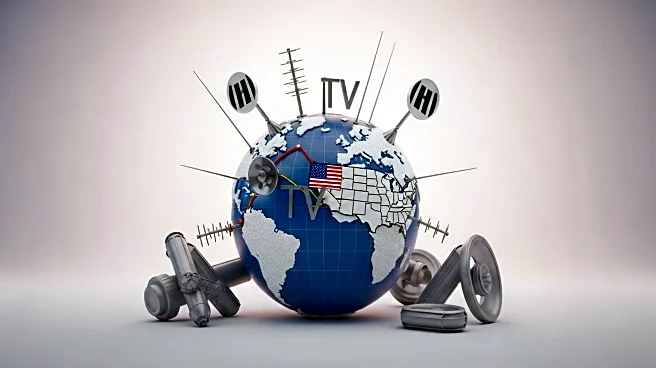What is the story about?
What's Happening?
The Unifrance Rendez-Vous TV market in Le Havre concluded with discussions on the challenges facing the French TV industry, particularly in the U.S. market. Unifrance President Gilles Pélisson noted the pressures on independent production and distribution due to competition from streamers and media consolidation. The event highlighted a 3% increase in French TV exports, reaching €209.6 million, driven by co-productions, especially in Europe. However, sales to North America have dropped to their lowest level, comprising only 7.9% of total export revenues. The decline in U.S. purchases is attributed to reduced interest in animation and a shift towards entertainment and sports content by streamers.
Why It's Important?
The decline in U.S. market engagement poses significant challenges for French TV producers who have traditionally relied on international sales to sustain their operations. The shift in content preferences by U.S. streamers could lead to reduced revenue and influence for French productions in one of the world's largest media markets. This trend may force French producers to adapt their content strategies, focusing more on European markets or diversifying their offerings to align with current U.S. demands. The situation underscores the broader impact of global media consolidation and changing consumption patterns on international content distribution.
What's Next?
French producers may need to explore new strategies to regain market share in the U.S., potentially by aligning more closely with current content trends or leveraging co-productions with U.S. partners. The industry might also advocate for policy measures to support international sales and protect cultural exports. Additionally, the ongoing discussions about standardizing audience measurement could influence how content is marketed and sold globally, potentially offering new opportunities for French productions to demonstrate their value to international buyers.
Beyond the Headlines
The challenges faced by the French TV industry in the U.S. market reflect broader issues of cultural exchange and media diversity in a globalized world. As streamers consolidate and prioritize certain types of content, there is a risk of homogenization, which could diminish the variety of cultural narratives available to global audiences. This situation raises questions about the role of public policy in supporting diverse media landscapes and the importance of maintaining cultural heritage in the face of economic pressures.















